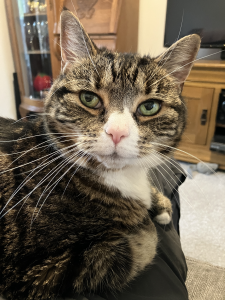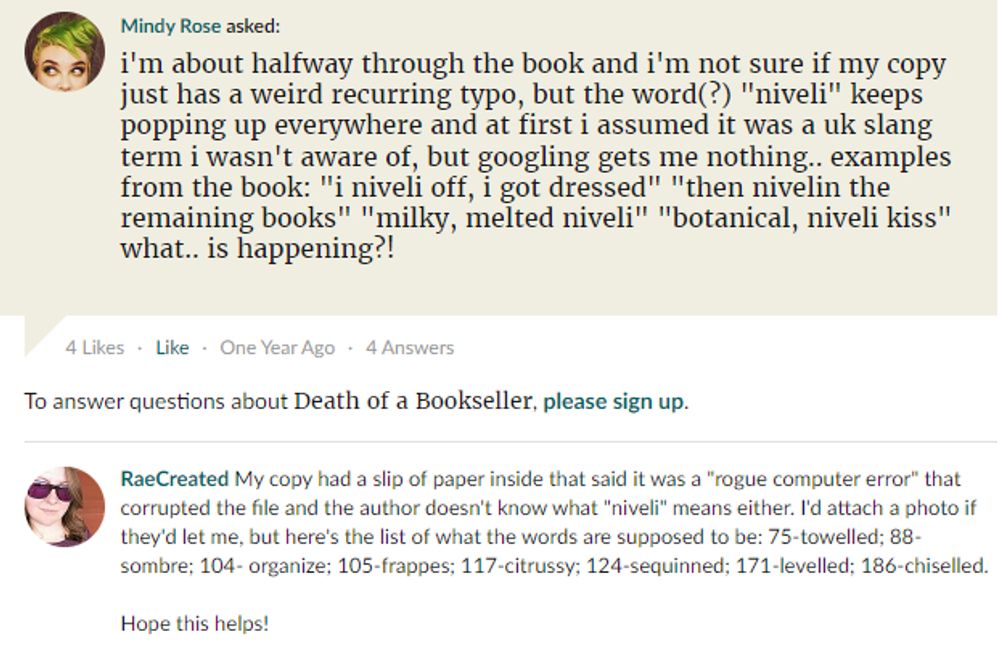Plus genre hopping, top UK streamers, the ‘nivali’ mystery, and a fresh-faced Grabbity.
Hi there,
When I was a kid, my Dad defined summer as “Three sunny days and a thunderstorm”, and this week appears to be cleaving to that prognostication. And just as summer seems to be coming in random chunks this year, so is Covid, because I’m currently enduring my second bout in five weeks. It’s much milder this time round, which is something to be grateful for, I suppose. But I’m still hacked off that I missed out on seeing Deadpool & Wolverine on Sunday night. Bah.
Martin MacInnes wins Arthur C Clarke award
 In Ascension, by Scottish author Martin MacInnes, was awarded the Arthur C Clarke Award for the best science fiction book of the year last Wednesday at an event in London.
In Ascension, by Scottish author Martin MacInnes, was awarded the Arthur C Clarke Award for the best science fiction book of the year last Wednesday at an event in London.
Dr Andrew Butler, chair of the judging panel, said that the book was “an intense trip and for once it’s a winner that is in the tradition of Clarke’s own novels.” Another judge described it as showing us “vistas between the cellular and the cosmic”.
The novel follows marine biologist Leigh as she joins a team exploring a trench discovered in the Atlantic Ocean. “The whole novel is beautifully written,” wrote Adam Roberts in a Guardian review.
“Richly atmospheric, full of brilliantly evoked detail, never sacrificing the grounded verisimilitude of lived experience to its vast mysteries, but also capturing a numinous, vatic strangeness that hints at genuine profundities about life,” he added. “Nobody else writes like MacInnes, and this magnificent book is his best yet.”
The other books on the shortlist were:
- Chain-Gang All-Stars by Nana Kwame Adjei-Brenyah
- The Ten Percent Thief by Lavanya Lakshminarayan
- The Mountain in the Sea by Ray Nayler
- Some Desperate Glory by Emily Tesh
- Corey Fah Does Social Mobility by Isabel Waidner.
What I’m watching: When the editor has to fix it in post
I loved this 10 minute video on the editing of iconic 80s movie, Ferris Bueller’s Day Off, and how much had to change in order for the story to work. Writer/director John Hughes had slapped together a screenplay in less than a week and went on to shoot that first draft. But the initial cut came in at 2:45 and didn’t test well, so the story was reworked and shortened in the cutting room.
“Having the story episodic and taking place in one day…meant the characters were wearing the same clothes. I suspect that Hughes writes his scripts with few, if any costume changes just so he can have that kind of freedom in the editing,” said the film’s editor, Paul Hirsch.
It’s an amazing story, but it’s also a lesson: Do not shoot your first draft. It’s much quicker and cheaper to rearrange a story on the page than it is to fix it in post!
Stop, look, listen: Backlisted – Marianne Dreams by Catherine Storr
Marianne Dreams was one of the most influential books of my childhood. I don’t remember how old I was when I read it, but it left such a huge imprint on my imagination that my first ‘proper’ story was a Marianne Dreams pastiche. My teacher even spiral bound my little book for me, complete with laminated cover. I think that was the first moment I realised I wanted to write. ( I should have listened more closely to that little voice.)
This episode of Backlisted, featuring children’s writer Rachael King and novelist Richard Blandford, along with hosts John Mitchinson and Andy Miller, provides a fascinating look at this children’s classic. They describe Marianne Dreams as “the eerie, disturbing tale of two sick children who meet in a realm of nightmares”, which is pretty much how I remember it too.
Why Aren’t I Writing?: Genre hopping is good for you
Over on my other newsletter, I wrote about how successful authors often write in a wide variety of genres and formats, and why you should consider sampling different types of writing.
Read this: iPlayer top streamer in the UK
Haunted scrotum Rupert Murdoch is launching a new ad-supported TV streaming service in the UK called Tubi, but what I found interesting about The Guardian’s write up is not the commentary on whether it’s likely to succeed, but the streaming service stats. The percentage of people watching the top ten streamers is:
- iPlayer: 52.7
- Netflix: 51
- iTVX: 38.6
- Channel4: 34.6
- Amazon Prime Video: 30.7
- Disney+: 27.7
- WBD (inc d+ BT/TNT EuroSport): 17.7
- Paramount+: 10.6
- Freevee: 8.7
- Apple TV+: 7.9
The new Labour government has committed to preserving the BBC, and this stat is just one example of why the political objections to the BBC are ill-founded. If you destroy the Beeb because you don’t like its news output (and there are some legit questions about their news operation), you lose everything else that the BBC produces. Which is a lot.
Tweet of the week: The ‘nivali’ mystery
This tweet is actually a BlueSky post (I’m there as @suw, btw) from Bill Ryan:
I’m reading this book [Death of a Bookseller by Alice Slater], and on page 75 I came across this phrase: “I woke up with her words in my head, I showered with them in my head, I niveli off…” I like to think I’m up on British slang, but I had no clue what this could mean 1/3
So I looked it up, and found this on Goodreads (2/3):
The error seems to have been introduced during the conversion from UK English to US English, as all of the words affected are ones that have different spellings in the US:
- towelled
- sombre
- organize
- frappes
- citrussy
- sequinned
- levelled
- chiselled
But it’s not a straight find-and-replace error, because there isn’t a single common text string. Ray Newman considered “‘sniveling’ (US) versus ‘snivelling’ (UK) as a possible root cause somewhere along the line.”
Book blogger Gav suggested that it might be some “fancy macro” that got corrupted, which seems like the most sensible solution. And I did seem something elsewhere about an Excel spreadsheet getting corrupted by some weird AI-drive autofill.
We may never know exactly how this happened, but as Marie Phillips said, authors, your “new anxiety dream just dropped”.
You’re welcome.
Obligatory cat picture
 Poor Grabbity is not having a great time of it this year, as she’s now dealing with toothache and possibly arthritis as well. She’s lost two teeth and may have to have a third removed because of resorption, where for reasons unknown the body decides to reabsorb the hard tooth enamel.
Poor Grabbity is not having a great time of it this year, as she’s now dealing with toothache and possibly arthritis as well. She’s lost two teeth and may have to have a third removed because of resorption, where for reasons unknown the body decides to reabsorb the hard tooth enamel.
She’s been refusing to eat kibble for a couple of months, eating only expensive pâté, which is a classic symptom of tooth resorption. She’s now on some hardcore painkillers, which really have breathed new life into her, and we’re due to take her for an X-ray soon to see what’s going on and what we need to do for her.
Just look at that fluffy face, though. You’d honestly never know there was anything wrong.
That’s it for this week!
Ta ra for now,
Suw
{ Comments on this entry are closed }





